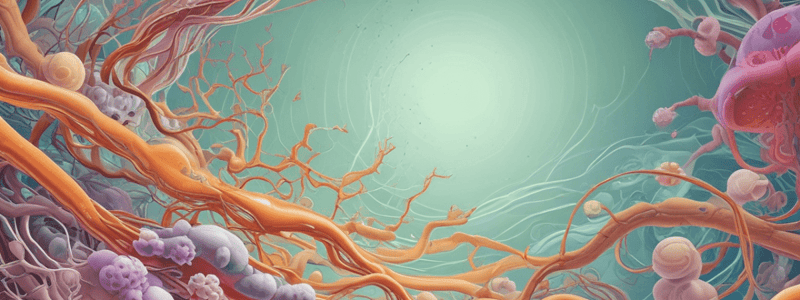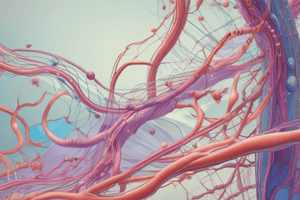Podcast
Questions and Answers
What type of collagen is responsible for providing the extracellular framework in hard and soft tissues?
What type of collagen is responsible for providing the extracellular framework in hard and soft tissues?
- Type I (fibrillar) collagen (correct)
- Type III (fibrillar) collagen
- Type IV (basement membrane) collagen
- Type II (network-forming) collagen
What process occurs in the granulation tissue stage of fibrous repair, leading to wound contraction?
What process occurs in the granulation tissue stage of fibrous repair, leading to wound contraction?
- Phagocytosis of necrotic tissue debris
- Synthesis of collagen by fibroblasts
- Contraction of fibrils within myofibroblasts (correct)
- Proliferation of endothelial cells
What is the primary function of collagen in the fibrous repair process?
What is the primary function of collagen in the fibrous repair process?
- To provide a scaffold for cell proliferation
- To facilitate cell migration and differentiation
- To provide the extracellular framework for tissue structure (correct)
- To synthesise growth factors and cytokines
What is the repeating sequence found in the collagen triple helix?
What is the repeating sequence found in the collagen triple helix?
Why does fibrous repair occur in response to tissue injury?
Why does fibrous repair occur in response to tissue injury?
What is the primary cell type responsible for synthesising collagen during fibrous repair?
What is the primary cell type responsible for synthesising collagen during fibrous repair?
What is the term for the process of new capillary growth into the wounded area?
What is the term for the process of new capillary growth into the wounded area?
What is the mature form of granulation tissue following fibrous repair?
What is the mature form of granulation tissue following fibrous repair?
What is the primary function of vitamin C in collagen synthesis?
What is the primary function of vitamin C in collagen synthesis?
What is the characteristic feature of Ehlers-Danlos syndrome?
What is the characteristic feature of Ehlers-Danlos syndrome?
What is the result of abnormal type IV collagen in Alport syndrome?
What is the result of abnormal type IV collagen in Alport syndrome?
What is the consequence of collagen defects in Scurvy?
What is the consequence of collagen defects in Scurvy?
Which of the following is NOT a characteristic of Osteogenesis imperfecta?
Which of the following is NOT a characteristic of Osteogenesis imperfecta?
What is the final step in collagen synthesis?
What is the final step in collagen synthesis?
What is the role of fibroblasts in collagen synthesis?
What is the role of fibroblasts in collagen synthesis?
What is the result of the cross-linking of collagen molecules?
What is the result of the cross-linking of collagen molecules?
What is the primary role of adult stem cells in regeneration?
What is the primary role of adult stem cells in regeneration?
Which type of stem cells are found in cord blood and are rich in mesenchymal stem cells (MSC) and HSC?
Which type of stem cells are found in cord blood and are rich in mesenchymal stem cells (MSC) and HSC?
What is the characteristic of labile tissues?
What is the characteristic of labile tissues?
What is the classification of stem cells based on their differentiation potential?
What is the classification of stem cells based on their differentiation potential?
What is the characteristic of stem cells that are unipotent?
What is the characteristic of stem cells that are unipotent?
What is the role of bone marrow-derived stem cells?
What is the role of bone marrow-derived stem cells?
What is the difference between regeneration and healing?
What is the difference between regeneration and healing?
What is the characteristic of induced pluripotent stem cells?
What is the characteristic of induced pluripotent stem cells?
Flashcards are hidden until you start studying
Study Notes
Collagen Synthesis
- Collagen is synthesized by fibroblasts and myofibroblasts through the following process:
- Preprocollagen is produced in the cell, modified to procollagen, and secreted from the cell.
- Procollagen is then cleaved to produce fibrillar collagen with considerable cross-linking between molecules, providing tensile strength.
Collagen-Related Diseases
- Scurvy: a disease caused by vitamin C deficiency, which is required for hydroxylation of procollagen, leading to poor wound healing and fragile capillaries.
- Ehlers-Danlos syndrome: a group of inherited disorders characterized by collagen fibers with inadequate tensile strength, resulting in hyperextensible skin, fragile joints, and poor wound healing.
- Osteogenesis imperfecta: a disease characterized by brittle bones, blue sclerae, hearing impairment, and dental abnormalities due to inadequate collagen.
- Alport syndrome: an X-linked disease caused by abnormal type IV collagen, leading to dysfunction of the glomerular basement membrane, cochlea, and lens of the eye, resulting in hematuria, chronic renal failure, neural deafness, and eye disorders.
Fibrous Repair/Organization
- Fibrous repair occurs when the collagen framework of a tissue is destroyed, there is chronic inflammation, or necrosis of specialized parenchymal cells that cannot be replaced.
- The process involves phagocytosis of necrotic tissue debris, angiogenesis, proliferation of fibroblasts and myofibroblasts, and the formation of granulation tissue, which matures into a fibrous scar.
- Collagen synthesis is essential for fibrous repair.
Collagen Structure and Function
- Collagen is the most common protein in the animal world, with 27 different types.
- Type I (fibrillar) collagen is the most common type in the body, present in hard and soft tissues.
- Collagen consists of a triple helix of three polypeptide alpha chains with a gly-x-y repeating sequence.
Stem Cells
- Classification of stem cells based on their differentiation potential: pluripotent, multipotent, and unipotent.
- Types of stem cells: embryonic stem cells, adult stem cells, induced pluripotent stem cells, and cord blood stem cells.
- Roles of adult stem cells in regeneration: replacement of used cells, healing, and regrowth.
- Adult stem cells in different tissues have different roles in healing, such as bone marrow-derived stem cells that produce multipotent haematopoietic stem cells.
Regenerative Capacity of Cells and Tissues
- Cells can be classified into three groups based on proliferative activity and link to their stem cells: labile, stable, and permanent.
- Labile tissues continuously divide and have rapid proliferation for regeneration.
- Stable tissues are quiescent and have variable speeds of regeneration.
- Permanent tissues are non-dividing and have no effective regeneration.
Studying That Suits You
Use AI to generate personalized quizzes and flashcards to suit your learning preferences.



